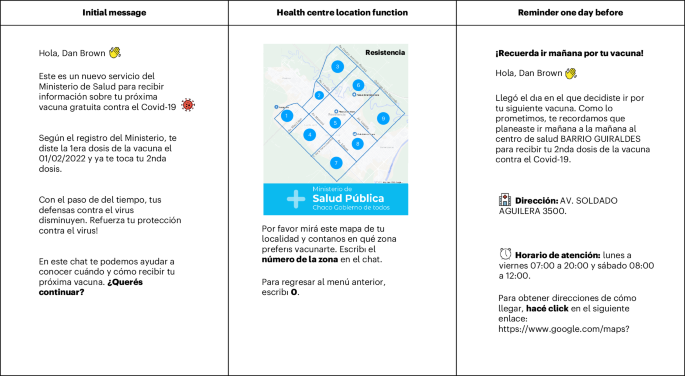A behaviourally informed chatbot increases vaccination rates in Argentina more than a one-way reminder
IF 21.4
1区 心理学
Q1 MULTIDISCIPLINARY SCIENCES
引用次数: 0
Abstract
Maintaining COVID-19 vaccine demand was key to ending the global health emergency. To help do this, many governments used chatbots that provided personalized information guiding people on where, when and how to get vaccinated. We designed and tested a WhatsApp chatbot to understand whether two-way interactive messaging incorporating behaviourally informed functionalities could perform better than one-way message reminders. We ran a large-scale preregistered randomized controlled trial with 249,705 participants in Argentina, measuring vaccinations using Ministry of Health records. The behaviourally informed chatbot more than tripled COVID-19 vaccine uptake compared with the control group (a 1.6 percentage point increase (95% confidence interval, (1.36 pp, 1.77 pp)) and nearly doubled uptake compared with the one-way message reminder (a 1 percentage point increase (95% confidence interval, (0.83 pp, 1.17 pp)). Communications tools designed with behaviourally informed functionalities that simplify the vaccine user journey can increase vaccination more than traditional message reminders and may have applications to other health behaviours. A chatbot informed by insights from behavioural science more than tripled COVID-19 vaccination uptake in Chaco province, Argentina, and nearly doubled it compared with a one-way message reminder.


在阿根廷,行为信息聊天机器人比单向提醒更能提高疫苗接种率
维持对 COVID-19 疫苗的需求是结束全球卫生紧急状况的关键。为了帮助实现这一目标,许多政府使用聊天机器人提供个性化信息,指导人们在何时何地如何接种疫苗。我们设计并测试了一个 WhatsApp 聊天机器人,以了解包含行为信息功能的双向互动信息是否比单向信息提醒效果更好。我们在阿根廷开展了一项大规模的预先登记随机对照试验,有 249 705 人参加,使用卫生部的记录来衡量疫苗接种情况。与对照组相比,行为知情聊天机器人的 COVID-19 疫苗接种率提高了两倍多(提高了 1.6 个百分点(95% 置信区间为 1.36pp,1.77pp)),与单向信息提醒相比,接种率提高了近一倍(提高了 1 个百分点(95% 置信区间为 0.83pp,1.17pp))。与传统的信息提醒相比,具有简化疫苗用户接种过程的行为知情功能的通信工具能更有效地提高疫苗接种率,并可应用于其他健康行为。
本文章由计算机程序翻译,如有差异,请以英文原文为准。
求助全文
约1分钟内获得全文
求助全文
来源期刊

Nature Human Behaviour
Psychology-Social Psychology
CiteScore
36.80
自引率
1.00%
发文量
227
期刊介绍:
Nature Human Behaviour is a journal that focuses on publishing research of outstanding significance into any aspect of human behavior.The research can cover various areas such as psychological, biological, and social bases of human behavior.It also includes the study of origins, development, and disorders related to human behavior.The primary aim of the journal is to increase the visibility of research in the field and enhance its societal reach and impact.
 求助内容:
求助内容: 应助结果提醒方式:
应助结果提醒方式:


